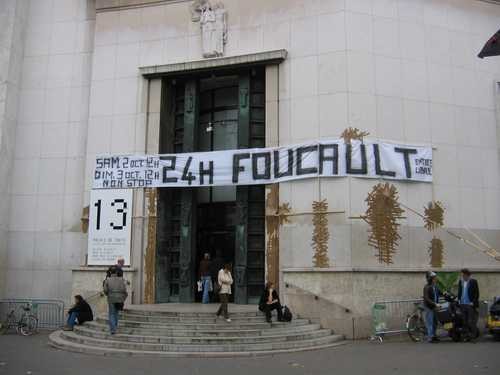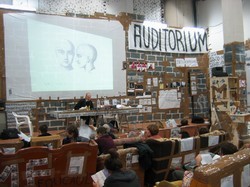WHY MICHEL FOUCAULT? INTEGRATED TEXT FOR THOMAS HIRSCHHORN WITH DANIEL DEFERT, PHILLIPPE ARTIÈRES, GUILLAUME DESANGES, MARCUS STEINWEG "24H FOUCAULT" (PARIS 2004)

Photo: Thomas Hirschhorn with Daniel Defert, Philippe Artières, Guillaume Desanges, Marcus Steinweg
"24h Foucault"
http://www.palaisdetokyo.com/index.php?npage=fr/prog/proj/hirschhorn.html
"24h Foucault"
http://www.palaisdetokyo.com/index.php?npage=fr/prog/proj/hirschhorn.html

Photo: Thomas Hirschhorn with Daniel Defert, Phillippe Artières, Guillaume Desanges, Marcus Steinweg
"24h Foucault"
http://www.palaisdetokyo.com/index.php?npage=fr/prog/proj/hirschhorn.html
"24h Foucault"
http://www.palaisdetokyo.com/index.php?npage=fr/prog/proj/hirschhorn.html

Photo: Thomas Hirschhorn with Daniel Defert, Phillippe Artières, Guillaume Desanges, Marcus Steinweg
"24h Foucault"
http://www.palaisdetokyo.com/index.php?npage=fr/prog/proj/hirschhorn.html
"24h Foucault"
http://www.palaisdetokyo.com/index.php?npage=fr/prog/proj/hirschhorn.html
2. Because the question of the subject is the foundation of a work which develops as the self-questioning of a SELF that does not exist.
3. Because philosophy in Foucault's sense is a PERSONAL EXPERIENCE, an act of solitude. The solitude of the subject of philosophical experience has nothing to do with pathetic or narcissistic, depressive self-enclosure. The solitude of the philosophical subject is an act of resistance. The subject resists the easiness of mere opinion. It opens itself to new experiences, the EXPERIENCE OF THE NEW SELF.
4. Because, to read Foucault is such an experience of the new.
5. Because Foucault's entire oeuvre is ruled by this WILL FOR THE REAL. Foucault himself experiences the affect of the real. Wasn't the experience of Tunisia nothing other than such an experience of real resistance of the reality of students struggling for their freedom who found themselves exposed to completely different dangers than their European counterparts in May 1968? In this definite sense, as the subject of the will to reality, Foucault is an EXISTENTIAL, and not an existentialist thinker. Foucault produces theory, but his theories come from the existential passion for the LIMITS OF THEORY. Together with Georges Bataille, Foucault is the thinker of the idea of TRANSGRESSION.
6. Because Foucault’s a way of reading Anti-Oedipus as "an introduction to non-fascist living", as a BOOK OF ETHICS, conveys an essential gesture: what we need today is a new kind of ethical thinking that resists the moralist, nihilist tradition.
7. Because Foucault thinks through the ambivalence or contradictoriness of the Enlightenment. The relationship between KNOWLEDGE and POWER unsettles him in all phases of his work. The "problem of enlightenment," as he says in What Is Critique?, is the "principal problem of modern philosophy".
8. Because Foucault provides a new concept of historical experience and work. The conflict between Foucault and conventional historical scholarship is the conflict between ACTIVE, CREATIVE THINKING and passive bureaucracy and police work.
9. Because the idea of an HISTORICAL A PRIORI represents a problem that is as old as philosophy itself. Philosophy qua philosophy is nothing other than the conflict between the universal and the particular, between the idea and appearance, between structures and contingency, between words and things.
10. Because the question of the relationship between madness and reason touches the heart of the Western logos. The line of separation which distinguishes reason from non-reason passes through the LOGOS IN GENERAL like a fissure.
11. Because, together with Maurice Blanchot, Foucault provides a radical understanding of ANONYMITY to think through. It is this anonymity which distances the subject from itself. It decomposes the classical idea of authorship. The subject of anonymity is the EGO WITHOUT EGOITY, SUBJECT WITHOUT SUBJECTIVITY.
12. Because Foucault is one of the most brilliant writers of our time. His style seems to oscillate between exact analysis and a kind of fascinating HYPERBOLISM. It is as if his language moved toward the madness of silence, i.e. toward the reality of its factical overtaxing. Above all, a book such as The History of Madness is such a document of a BEAUTIFUL and, in the concrete sense of the word, SPECULATIVE HISTORICISM.
13. Because the DEATH OF THE HUMAN means the death of a certain figure of the subject. The new subject which survives this, its own death is the subject of constant self-derangement and constant disappearance, the dissolution of itself.
14. Because the questioning of the relationship between truth and power constitutes the sphere of a new thinking of RESPONSIBILITY. Like Nietzsche, Foucault is the thinker of an ETHICS BEYOND THE CLASSICAL CONCEPT OF TRUTH.
15. Because Foucault's entire thinking seems to prepare the emergence or coming of a NEW FORM, as Deleuze says, of a new figure of the human which is neither a human-god nor a god-human.
16. Because Foucault, in his last books, L ́Usage des plaisirs and Le Souci de soi, defines life as a work of art. The self or the subject increasingly becomes an object. This SELF-OBJECTIVIZATION becomes the starting-point of a future POLITICS OF THE SELF.
